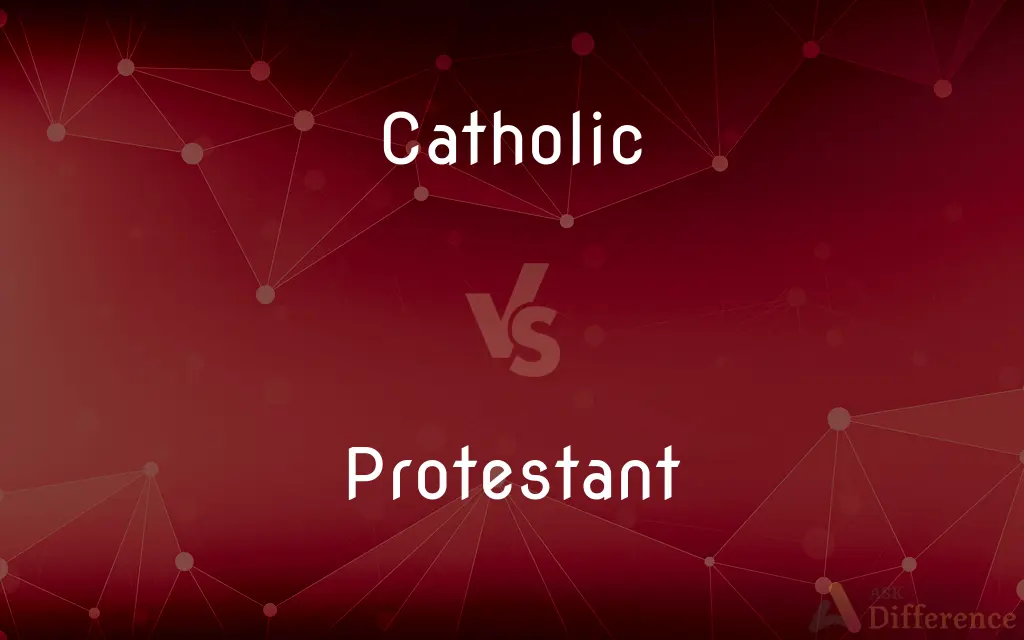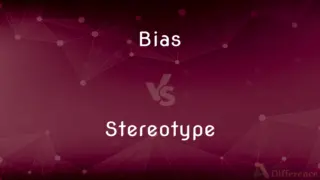Catholic vs. Protestant — What's the Difference?
By Tayyaba Rehman — Updated on September 23, 2023
Catholics adhere to the Roman Catholic Church led by the Pope; Protestants reject papal authority, emphasizing individual faith.

Difference Between Catholic and Protestant
Table of Contents
ADVERTISEMENT
Key Differences
Catholic and Protestant are both branches of Christianity, yet they hold differences in beliefs, traditions, and practices. One significant difference lies in their governance. Catholics recognize the authority of the Pope, the Bishop of Rome, as the head of the Church. Protestants, in contrast, do not recognize papal authority, often emphasizing local church governance.
Doctrine also differs between Catholic and Protestant traditions. For instance, Catholics believe in the transubstantiation of the Eucharist, meaning that bread and wine become the actual body and blood of Christ during the Mass. Protestants view Communion more symbolically, often believing in a spiritual presence rather than a physical change.
The source of religious authority varies between Catholics and Protestants. Catholics hold to the authority of both the Bible and the Church's sacred tradition. Protestants, especially during the Reformation, championed the idea of "sola scriptura," which emphasizes the Bible alone as the supreme source of divine revelation.
Sacraments are another area of difference. Catholics recognize seven sacraments, including Confirmation and the Anointing of the Sick. Protestants typically acknowledge only two: Baptism and Communion (or the Lord's Supper). Additionally, the role of saints and the Virgin Mary is more prominent in Catholic theology and devotion compared to most Protestant traditions.
Comparison Chart
Head of Church
Pope in Rome
No centralized authority
ADVERTISEMENT
Eucharist Belief
Transubstantiation
Symbolic or Spiritual Presence
Authority
Bible and Sacred Tradition
Sola Scriptura (Bible Alone)
Number of Sacraments
Seven
Usually Two (Baptism and Communion)
Role of Mary/Saints
More prominent devotion and intercession
Lesser focus, often no intercession
Compare with Definitions
Catholic
Adhering to traditions of the Pope and Vatican.
The Catholic doctrine is guided by the Vatican.
Protestant
Originated during the Reformation opposing certain Catholic practices.
Martin Luther, a key Protestant Reformer, challenged the Catholic Church's sale of indulgences.
Catholic
Emphasizing both Scripture and Sacred Tradition.
For a Catholic, both the Bible and the Church's teachings are sources of faith.
Protestant
A member of Christian denominations not in communion with the Pope.
He converted from being Catholic to Protestant.
Catholic
Observing transubstantiation in the Eucharist.
Catholics believe that the bread and wine become Christ's body and blood.
Protestant
Believes primarily in the authority of the Bible.
The Protestant principle of sola scriptura emphasizes the Bible's central role.
Catholic
Of the Roman Catholic faith.
Protestant
Typically recognizes two main sacraments.
In her Protestant church, they celebrate Baptism and the Lord's Supper.
Catholic
A member of the Roman Catholic Church.
Protestant
A member of a Western Christian church whose faith and practice are founded on the principles of the Reformation, especially in the acceptance of the Bible as the sole source of revelation, in justification by faith alone, and in the universal priesthood of all the believers.
Catholic
Of broad or liberal scope; comprehensive
"The 100-odd pages of formulas and constants are surely the most catholic to be found" (Scientific American).
Protestant
A member of a Western Christian church adhering to the theologies of Luther, Calvin, or Zwingli.
Catholic
Including or concerning all humankind; universal
"what was of catholic rather than national interest" (J.A. Froude).
Protestant
One of the German princes or cities that supported the doctrines of Luther and protested against the decision of the second Diet of Speyer (1529) to enforce the Edict of Worms (1521) and deny toleration to Lutherans.
Catholic
Of or involving the Roman Catholic Church.
Protestant
Protestant (also prə-tĕstənt) One who makes a declaration or avowal.
Catholic
Of or relating to the universal Christian church.
Protestant
Of or relating to Protestants or Protestantism.
Catholic
Of or relating to the ancient undivided Christian church.
Protestant
Alternative case form of Protestant
A protestant effort
Protestant work ethic
Catholic
Of or relating to those churches that have claimed to be representatives of the ancient undivided church.
Protestant
Protesting.
Catholic
A member of a Catholic church, especially a Roman Catholic.
Protestant
(slang) Not allowing unsafe sex. (Cf. catholic)
Catholic
Universal; all-encompassing.
Protestant
One who protests; a protester.
Catholic
Alternative case form of Catholic.
Protestant
Alternative case form of Protestant
Catholic
(obsolete) Common or prevalent; especially universally prevalent.
Protestant
One who protests; - originally applied to those who adhered to Luther, and protested against, or made a solemn declaration of dissent from, a decree of the Emperor Charles V. and the Diet of Spires, in 1529, against the Reformers, and appealed to a general council; - now used in a popular sense to designate any Christian who does not belong to the Roman Catholic or the Greek Church.
Catholic
Embracing all.
Protestant
Making a protest; protesting.
Catholic
Universally applicable.
Protestant
Of or pertaining to the faith and practice of those Christians who reject the authority of the Roman Catholic Church; as, Protestant writers.
Catholic
Of universal human interest or use.
Protestant
An adherent of Protestantism
Catholic
(slang) Permissive of unprotected sex.
Protestant
The Protestant churches and denominations collectively
Catholic
Universal or general; as, the catholic faith.
Men of other countries [came] to bear their part in so great and catholic a war.
Protestant
Of or relating to Protestants or Protestantism;
Protestant churches
A Protestant denomination
Catholic
Not narrow-minded, partial, or bigoted; liberal; as, catholic tastes.
Protestant
Making a protest
Catholic
Of or pertaining to, or affecting the Roman Catholics; as, the Catholic emancipation act.
Protestant
Rejects papal authority in religious matters.
The Protestant churches operate independently of the Vatican.
Catholic
A person who accepts the creeds which are received in common by all parts of the orthodox Christian church.
Catholic
An adherent of the Roman Catholic church; a Roman Catholic.
Catholic
A member of a Catholic church
Catholic
Of or relating to or supporting Catholicism;
The Catholic Church
Catholic
Free from provincial prejudices or attachments;
Catholic in one's tastes
Catholic
Recognizing seven sacraments.
Confirmation is a sacrament celebrated in the Catholic Church.
Common Curiosities
Do Catholics and Protestants use the same Bible?
Both use the Bible, but the Catholic Bible includes several books not found in most Protestant Bibles.
Who leads the Catholic Church?
The Pope, currently residing in the Vatican, leads the Catholic Church.
Are Anglicans considered Protestant?
Yes, the Anglican Church emerged during the Reformation and is considered a Protestant denomination.
Do both Catholics and Protestants believe in the Trinity?
Yes, both believe in the Father, Son, and Holy Spirit.
How do Protestants view salvation?
Many Protestants believe in salvation by faith alone ("sola fide").
Why did the Protestant Reformation occur?
It began due to disagreements with certain Catholic teachings and practices, leading to the creation of Protestant denominations.
What's the Catholic view on salvation?
Catholics believe salvation is a combination of God's grace, the sacraments, and good works.
Do Catholics pray to saints?
Catholics ask saints to intercede on their behalf, not praying to them as gods.
What is the "sola scriptura" principle?
"Sola scriptura" is a Protestant belief that the Bible alone is the ultimate source of authority in Christianity.
How do Protestants view the Eucharist?
Views vary, but many see it as symbolic or believe in a spiritual presence.
How do Catholics and Protestants view the Virgin Mary?
Catholics hold a more prominent veneration for Mary than most Protestants.
Are there many Protestant denominations?
Yes, there are numerous Protestant denominations, each with distinct beliefs and practices.
Why do Catholics have the sacrament of Confirmation?
Confirmation is seen as a strengthening of baptismal grace and commitment to the Church.
Can Catholics take communion in Protestant churches?
Officially, Catholics are discouraged from taking communion in non-Catholic churches.
Share Your Discovery

Previous Comparison
Wedding vs. Marriage
Next Comparison
Bias vs. StereotypeAuthor Spotlight
Written by
Tayyaba RehmanTayyaba Rehman is a distinguished writer, currently serving as a primary contributor to askdifference.com. As a researcher in semantics and etymology, Tayyaba's passion for the complexity of languages and their distinctions has found a perfect home on the platform. Tayyaba delves into the intricacies of language, distinguishing between commonly confused words and phrases, thereby providing clarity for readers worldwide.
















































